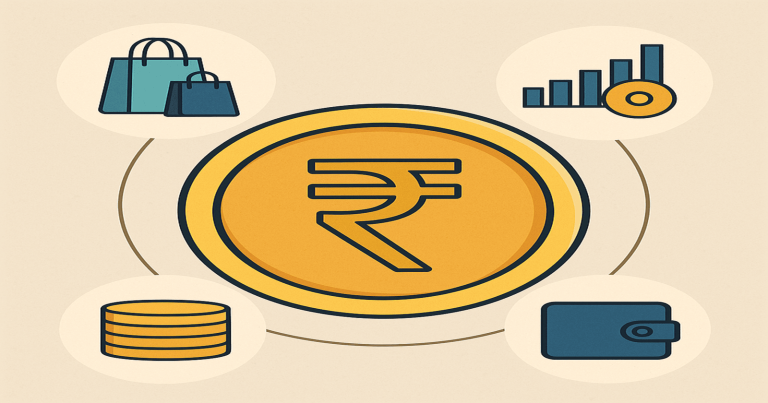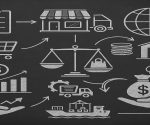Money is the foundation of all economic activity. It is used every day to buy goods, pay for services, save for the future, and settle debts. But money is more than just currency in our wallets—it performs specific roles that make trade and transactions possible. These are referred to as the fundamental functions of money, and they are to act as a medium of exchange, unit of account, store of value, and standard of deferred payment. Collectively, these make money a very effective tool for individuals, firms, and governments.
Primary Functions of Money
Money plays a central role in any economy. It helps individuals, businesses, and governments carry out day-to-day transactions and long-term financial activities. But money is not just a piece of paper or metal—it has specific functions that make trade and economic growth possible. The most essential roles money plays are called the primary functions of money.
These functions show how money solves the problems of a barter system, such as lack of common value, difficulty in exchange, and storage issues. By performing these roles, money becomes the backbone of all economic activity. Let’s understand these primary functions in detail with examples.
1. Medium of Exchange
The most basic and widely used function of money is as a medium of exchange. This means that money is accepted as a common tool for buying and selling goods and services. In a barter system, people had to exchange goods directly. For example, a farmer with wheat needed to find someone who had rice and wanted wheat. This made trade complicated and time-consuming. Money solves this problem by acting as a universal medium that everyone accepts.
When you buy a book for ₹500, you are exchanging money for the value of that book. Similarly, your salary is paid in money so that you can use it to buy what you need, whether it’s groceries, clothes, or services.
Real-life Example:
A shopkeeper sells vegetables. You give ₹100 and get potatoes. The seller accepts money because they know they can use it to buy other goods or pay bills. This ease of exchange is what drives the market.
2. Unit of Account
Money also functions as a unit of account, which means it provides a standard measure of the value of goods and services. It allows everyone to know how much something costs and compare the prices of different products easily.
Without money, it would be hard to express the value of things. If you had to say, “1 chair = 10 apples” and “1 table = 20 bananas,” it would be confusing. Money makes it easy by assigning a numerical value to each item. This helps in comparing, budgeting, calculating profit, and keeping financial records.
All economic data like income, costs, GDP, and tax rates are expressed in terms of money because it gives a clear, common standard.
Real-life Example:
If a pen costs ₹20 and a notebook costs ₹100, you know that the notebook is worth five times more than the pen. This comparison is possible only because of the money’s unit of account function.
3. Store of Value
Another important primary function of money is that it acts as a store of value. This means that money can be saved and used in the future without losing its value easily. You don’t have to spend your money immediately. You can save it today and use it weeks or even years later. Unlike perishable goods like vegetables or milk, money doesn’t spoil. This helps individuals and businesses plan for the future, invest, or manage emergencies.
However, money may lose value if inflation is very high. Still, compared to goods and services, it remains the most convenient way to store purchasing power.
Real-life Example:
If you save ₹10,000 in your bank account today, you can use it next month to pay rent or buy groceries. This stability in value makes money reliable for savings.
4. Standard of Deferred Payment
Money also serves as a standard of deferred payment, which means it is used to make payments in the future for goods and services taken today. This function supports borrowing, lending, and installment-based transactions.
In modern economies, people take loans for education, business, or buying homes. These loans are paid back in money over time. Money’s acceptability and stability make it a common medium for settling future payments. It allows credit systems to function, helping both businesses and consumers.
Without money, it would not be easy to fix future payments. You couldn’t agree to repay a loan in terms of chickens or rice. But when the repayment is in rupees or dollars, both parties understand and accept it easily.
Real-life Example:
If you buy a mobile phone on EMI, the seller gives you the phone today, and you agree to pay ₹2,000 every month for six months. These future payments are made in money, showing how it works as a standard of deferred payment.
Why These Functions Matter
The main roles of money are not abstract theory—these are the working principles that underpin all economic systems, from the smallest neighborhood markets to worldwide financial systems. These functions make money a useful and reliable instrument for making transactions, budgeting, saving for the future, and meeting obligations. These are why they are so critical:
1. Enable Smooth Trade and Exchange
Through its role as a medium of exchange, money eliminates the largest shortcoming of barter—a double coincidence of wants. With money, you do not have to discover a person who not only possesses what you desire but also desires what you possess. This single purpose alone has transformed trade, making it quicker, wider, and more adaptable.
2. Create a Standard Value System
The money has also influenced that it provides an economic unit for appraising the commodities and services. It standardizes the price definitions, comparisons among goods, unit specifications in budgeting, accounting, and taxes. Without it, business and personal decisions would be nearly impossible to determine or assess accurately profits and losses.
3. Support Saving and Investment
The store of value function allows individuals and institutions to save money for future use. This encourages savings, which in turn fuels investments and economic growth. Because money holds its value over time, it provides the confidence people need to plan long-term goals such as buying a house, educating children, or starting a business.
4. Enable Credit and Deferred Payments
In modern economies, very few transactions are made entirely in cash. Loans, EMIs, and credit systems form a big part of the financial ecosystem. The function of money as a standard of deferred payment makes this possible. It allows trust between borrowers and lenders since both agree on a specific value and timeline for repayment. This supports the credit economy and boosts large-scale development.
5. Build Economic Trust and Stability
All these functions together make money a reliable and trusted medium that supports every layer of the economy. From a street vendor to a multinational company, everyone depends on money to conduct business, measure value, save wealth, and fulfil obligations. Without these functions, economic stability would collapse, and commerce would slow down drastically.
Primary Functions of Money FAQs
Q1. What are the four primary functions of money?
The four primary functions are medium of exchange, unit of account, store of value, and standard of deferred payment.
Q2. Which function of money helps in comparing the value of goods?
The unit of account function helps assign prices and compare the value of different goods and services.
Q3. Can money be used to store wealth?
Yes, money functions as a store of value, allowing people to save and use it in the future.
Q4. What makes money a good standard of deferred payment?
Money is widely accepted and holds value over time, which makes it suitable for future payments and loan settlements
Q5. Why is money better than the barter system?
Money removes the need for a double coincidence of wants, offers a common value, is portable, and stores value, which makes trade easier and more efficient.


